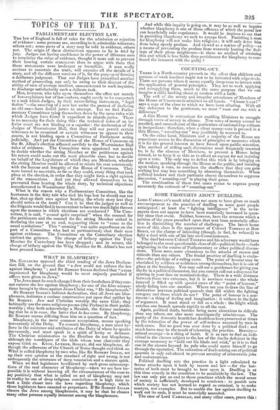TOPICS OF THE DAY.
PARLIAMENTARY ELECTION LAW.
THE law of England is full of rules for the admission or rejection of evidence : some persons are, according to it, admissible witnesses, others not ; some parts of a story may be told in evidence, others not. The origin of these distinctions appears to lie in trial by jury. Judges not having confidence in the power of illiterate men to scrutinize the Value of evidence, thought it more safe to prevent their hearing certain statements than to argue with them that these statements were irrelevant or incredible. A man really anxious to ascertain the truth, will examine all the details of a story, and all the different versions of it, for the purpose of forming a deliberate judgment. That our Judges have prescribed another method of proceeding, can only be owing to their distrust of the ability of men of average intellect, unaccustomed to such inquiries, to discharge-satisfactorily such a delicate task.
Men, however, who take upon themselves the office not merely of law-explainers but of law-makers, ought surely to be competent to a task which Judges, by their never-failing instrument, " legal fiction "—the enacting of a new law under the pretext of declaring an old one—have forbid juries to attempt. Yet we find Parlia- mentary Committees tying themselves down by the same rules with which Judges have found it expedient to muzzle juries. There is no necessity for their doing this : the technical rules of an in- ferior court are not binding on a superior : the declaration of the Judges of Westminster Hall, that they will not permit certain witnesses to be examined or certain witnesses to appear in their courts, is not binding upon a Committee of Parliament acting judicially. And yet the Committee of the House of Commons on the St. Alban's election adhered servilely to the Westminster Hall rules of evidence. The Committee were appointed not merely to decide whether the sitting Member or the petitioners against his return could make out the most plausible case, but to decide on behalf of the Legislature of which they are Members, whether the sitting Member could be allowed to retain his seat consistently with the honour and integrity of the House of Commons. They were bound to ascertain, as far as they could, every thing that took place at the election, in order that they might form a right opinion of the transactions. And yet they allowed themselves to be prevented from hearing the whole story, by technical objections manufactured in Westminster Hall.
What is the reason why a Parliamentary Committee, like the huntsman in the fairy tale who tied his legs lest he should run too fast, shut up their ears against hearing the whole story lest they should arrive at the truth ? Can it be that the judges as well as the litigants would find it inconvenient to have too much light thrown upon the manner in which elections are conducted ? The Com- mittee, it is said, "seemed quite surprised" when the counsel for the petitioners and the counsel for the sitting Member united in declaring the case at an end, requesting them to "come to the usual resolutions." This " seeming " was quite superfluous on the part of a Committee whn had so pertinaciously shut their ears against evidence. The Committee on the Canterbury election omitted the grimace. The charge of bribery against the Tory Member for Canterbury has been dropped ; and in return, the charge of bribery against the Whig Member for St. Alban's has not been pressed home.


























 Previous page
Previous page